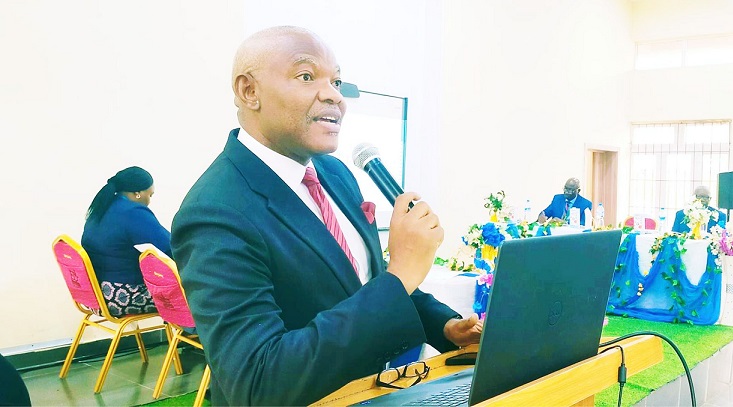
The Deputy Executive Secretary (DES) (Academics) of the National Universities Commission (NUC), Dr. Noel Biodun Saliu, has highlighted the urgent need for improved budgetary allocations and subventions to address the chronic underfunding of Nigerian universities.
Dr. Saliu made the call in his lecture entitled: The Nigerian University System and its Many Challenges: The Way Forward,” which he delivered at the 7th Annual Registry Lecture of Elizade University, Ilara-Mokin, Ondo State.
He emphasized that insufficient funding remained a significant barrier to the effective growth and development of the nation’s higher education system. He identified adequate funding as a critical solution to the issues of poor remuneration and inadequate research and development within Nigerian universities.
The NUC Deputy Executive Secretary called on private university owners to refrain from viewing their institutions as profit-making ventures for at least the first 10 years and urged them to employ qualified staff based on specific needs. “There should be improved budgetary allocation and releases to public universities and improved subventions for private universities by their respective owners,” he stated. He also highlighted the necessity for private university owners to provide more infrastructural facilities and employ qualified academic staff in line with institutional requirements.
Dr. Saliu further advocated for the review and strengthening of NUC laws to enhance the regulation of the Nigerian University System (NUS). He emphasized the importance of periodic curriculum reviews to reflect global realities and the expansion of access to university education through increased carrying capacity, the implementation of the Transnational Education (TNE) Policy, and the internationalisation of university education.
In the lecture, he identified several persistent challenges within the Nigerian University System (NUS), including inadequate funding, infrastructural deficits, poor remuneration, insecurity, insufficient research and development, the proliferation of illegal degree-awarding institutions, and weak regulatory laws.
“Funding, is very crucial to the growth and development of universities. The university system requires substantial funds for the effective discharge of its core mandates of teaching, research, and community service,” Dr. Saliu asserted.
He lamented that both public and private universities suffered from grossly inadequate annual budgetary allocations and releases from their respective proprietors.
According to him, studies have demonstrated that inadequate funding in Nigerian universities could be attributed to several factors, including poor government allocations, low internally generated revenue, low school fee charges for public universities, low enrollment in private universities due to high tuition fees, institutional corruption, poor planning, insufficient research income, and minimal contributions from the private sector, non-governmental organizations (NGOs), and alumni.
“Inadequate funding leads to the under-performance of all aspects relevant to the quality delivery of university education in Nigeria, including the quality assurance activities of the regulator (NUC),” he explained.
He stressed that the annual budget for university administration remained insufficient to provide the necessary infrastructural facilities and human resources required for optimal functioning. He also expressed concern about the appointment of inexperienced individuals to the governing councils of both private and public universities.
He stated the NUC frowned that some appointees see the positions as opportunities for financial gain rather than as a call to serve the university community. Dr. Saliu criticized the politicization of the appointment process for the chairpersons and members of university governing councils in Nigeria.
He also pointed out that some private university owners were persisting in running their institutions as family businesses, thereby undermining the authority of the Vice Chancellor.
He said the dissolution of governing councils by the President and Governors on the assumption of office was inimical to the growth of the university system.
He also emphasised that some Visitors to universities dictate the administrative operations of their universities without recourse to the law.
In his words: “Some Visitors to universities dictate the administrative operations of their universities without recourse to the respective University Law.
This scenario is mostly common with private and state universities. It has manifested in the dissolution of governing councils by new administrations both at the state and federal levels, and the arbitrary suspension or removal from office of Vice-Chancellors in some instances without regard to extant regulations.
“It is more worrisome in most private universities where some proprietors are unrepentant in the decision to run their universities as family businesses thereby usurping the powers of the Vice-Chancellor.
The appointment of inexperienced persons into university councils also calls for concern as most of the appointees, particularly for the public universities see such appointments as political settlement for money making and not a call to service,” he concluded.
In his remarks, former Vice-Chancellor of the Federal University of Technology, Akure (FUTA), Professor Adebisi Balogun, echoed these concerns, calling on the Federal Government to review the appointments to university governing councils.
Professor Balogun criticised the tendency to view these appointments as political rewards rather than genuine calls to service.
The Registrar of Elizade University, Mr. Omololu Adegbenro, noted that the lecture series, which began in 2016, was aimed at creating a suitable platform for discussing critical issues affecting the university system.
Mr Adegbenro expressed optimism that the lecture would inspire new perspectives, spark meaningful conversations, and foster connections.
The DES was accompanied to the conference by the NUC Acting Director, Inspection and Monitoring (DIM), NUC, Mrs Lydia Imoroa.
